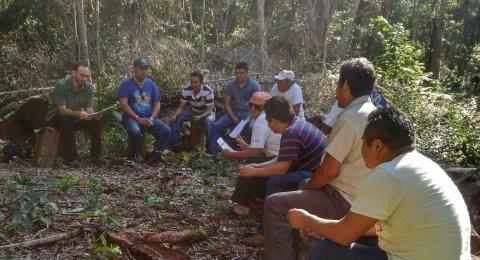FSC certification pays off for Brazilian rainforest people
In the coming months communities in the Laranjal do Jari, a small county of Northern Brazil, will reap the benefits from 50,000 dollars recently invested in mobile phone services.
In the near future, the communities will also profit from resources invested in formal training courses for their youngsters, mainly in the areas of forestry and agronomy.
FSC certification increases income
At first, one would imagine that money to finance these activities might have come from government sources, private companies or from some international donor. However, this is not the case.
The funds came from the São Francisco community involved in the production of FSC-certified Brazil nut oil that is sold to three cosmetic manufacturing companies. The São Francisco community is one among several communities organized within “Producers and Gatherers Cooperative of the Iratapuru River (COMARU), which received FSC certification in 2004.

Community forest certification audit
Eudimar dos Santos Viana lives in the São Francisco community and works as the certification coordinator of COMARU. Explains Eudimar: “The companies only buy from us and they pay a good price because the product is certified; before certification, it was very difficult to sell our product. Certification changed many things here, and for the better. We learned about many important subjects: how to properly dispose garbage, organize our accounts and manage our finances, cut only the trees that we are going to use, and also about international certification standards.”
Need for community forest label
These changes were confirmed first-hand by forester Patrícia Cota Gomes. She works for Imaflora, a nonprofit Brazilian NGO that carries out FSC assessments in collaboration with its FSC-accredited partner Rainforest Alliance. Patricia Gomes explains that it can be difficult for the communities to obtain economic benefits from certification.
“Once it is placed on a shelf to be sold, the product manufactured by local communities - usually made by hand and in small quantities – is seen as similar to other products that come from industrial processes. That is the reason why communities sometimes do not seem too eager to adopt certification,” she explains.
Patricia Gomes advocates the establishment of a specific label that would help consumers identify products manufactured by community members from those of other origins. She adds that this label becomes even more important when the role of smallholders and traditional populations in the conservation of tropical forests, curbing deforestation and diminishing poverty is considered. In Brazil, approximately 25% of the national territory is somehow controlled by these stakeholders.
Forest community certification in Brazil
Imaflora is the only Brazilian organization involved in certification of communities in the country. The organization places 5% of its income from corporate contracts into a special fund to help smallholders achieve certification. Imaflora has assisted eight Brazilian communities to become certified, involving approximately 200 families. They occupy an area of almost 1.8 million hectares, of which about 1.5 million hectares belong to the Kaiapó indian reservation.
Imaflora - The Institute for Forest and Agricultural Management and Certification (Instituto de Manejo e Certificação Florestal e Agrícola) - is a nonprofit Brazilian organization established in 1995 to promote the conservation and sustainable use of natural resources and to generate social benefits to the forest and agricultural sectors. For additional information, please, go to: www.imaflora.org
Story & picture from audit in the rainforest © Imaflora.
